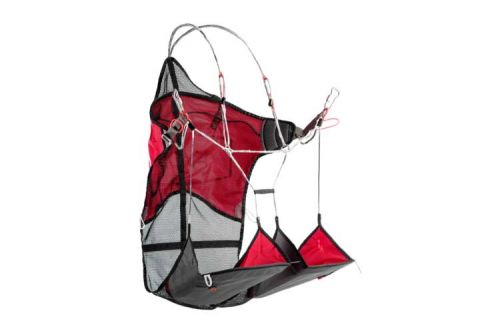The ultra-light hike & fly backpack X-PACK 50 weighs only 525 grams, and for this weight class, offers exceptional carrying comfort and practical features. The pack volume of 50 litres can be extended by an additional 10 litres thanks to the roll-top closure. The X-PACK 50 offers space for very compact lightweight equipment - ideal for hike & fly competitions.
Handle with care. This product was specially developed for hike & fly and is made of lightweight materials. For the longest possible enjoyment of the product, we recommend particularly careful handling of the equipment.
Features:
- Roll-top closure
- Compression system
- Customisable shoulder and chest straps and hip belt
- High comfort for this weight class, even at faster walking or running pace
- Elastic mesh pockets along the entire side panels
- Mesh pockets and Velcro straps on the front of the shoulder straps
- Airy spacer fabric on the back panel, hip belt and shoulder straps and doubled-up back area for reduced perspiration
- Drinking tube outlet
- Eight gear loops distributed over the entire backpack on the outside for helmet net and individual fastenings
Volume: 50+10 litres
Weight: 525 grams
Colour: Blue/Black
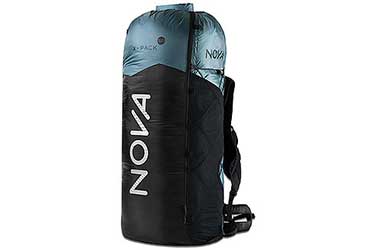
Ultra-light and comfortable.
The X-PACK 50 is the optimised and more sturdy version of the ultra-light competition version, which was developed for extreme hike & fly races. The 525 gram rucksack, made largely from paraglider cloth, is still very comfortable to wear, even at faster walking and running pace. A long and flat-packed wing, as well as the use of the extremely effective compression system, are the prerequisites for enjoying maximum wearing comfort.
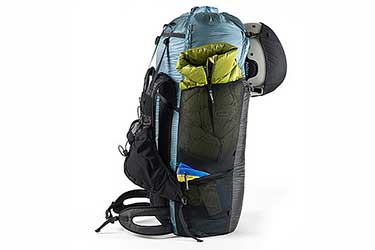
Practical pockets.
The X-PACK 50 is equipped with a number of external pockets that can be reached quickly and easily without taking off the rucksack. Along the entire side panels, elastic mesh pockets offer enough storage space for numerous accessories. They are accessible from above as well as through openings in the lower part. Inspired by modern trail running gilets, mesh pockets on the front of the shoulder straps allow you to stow small items such as cereal bars, sunscreen, power-pack, etc. There are also two Velcro straps on the shoulder for GPS trackers or smartphones.
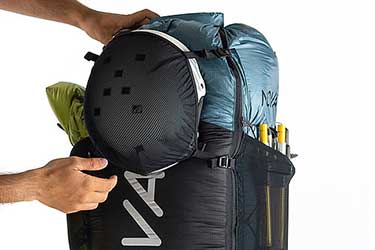
Customised to your needs.
To keep your paraglider protected during intense hikes, an airy spacer fabric on the back panel, hip belt and shoulder straps reduces sweat getting through from the back to the gear. The doubled-up back area offers additional protection against perspiration. Of course, there is a channel for the drinking tube. To save space inside the X-PACK 50, there are eight gear loops distributed over the entire backpack on the outside. Four of them are intended for the helmet net, the other four offer the possibility for individual fastenings.
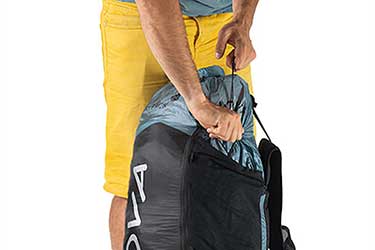
Packing.
The X-PACK 50 is specially designed for lightweight and compact hike & fly equipment and requires careful packing. A long and flat-packed wing significantly helps the wearing comfort. The compression system allows tight lacing along the back. The packing volume is approx. 50 litres, although this can be expanded by around 10 litres using the roll-top closure. There is no table that tells you which equipment will fit in the X-PACK 50, as this depends on various factors (size and packing size of the glider and harness, packing method, accessories, etc.). As a general rule, however, the smaller and more compact your equipment is, the better it will fit in your backpack.
- Product number
- 20230108
- Manufacturer
- Nova
How suitable is the X-PACK 50 for everyday use?
The athlete version has already been intensively tested in extreme hike & fly races. For the standard version, we use more sturdy paraglider fabric as well as additional reinforcements in highly stressed areas. Thanks to the empirical evidence and the choice of materials, the X-PACK 50 is suitable for everyday use - but of course not as robust as backpacks made from much thicker fabrics. However, if a small hole or tear should occur during use, you can quickly and easily remedy the situation with adhesive patches.
How do I optimise the carrying comfort of the X-PACK 50?
The load can either be distributed mainly to the hip belt or over the entire upper body. A long and flat-packed wing serves as a stiffening back element - like the frame in the carrying system of a trekking backpack. If you pack correctly, you can transfer the weight from your shoulders to your hips. With the help of the load control straps (= suspension straps between the shoulder straps and the rucksack) you can adjust how far back the rucksack hangs: uphill you set them a little longer, on the flat and downhill shorter. So there are various options to adjust the comfort of the X-PACK 50 to your requirements. Secret tip from hike & fly enthusiast Till Gottbrath: he folds his jacket flat and positions it between the back of the rucksack and the paraglider at lumbar level. This makes every hike & fly backpack fit even better.
Is the X-PACK 50 waterproof?
No, it is not waterproof. The use of ultra-light materials rules this out. There is no ultra-light backpack that is permanently waterproof. Our tip: fold a large plastic bag, for example, so that it covers the inside of the back. It costs very little, protects your wing from sweat, and when it really rains, you pack all your equipment in the plastic bag and put it in your backpack. Our Compression Bags offer the perfect protection against moisture.
What equipment fits in the X-PACK 50?
The packing volume of the X-PACK 50 is approximately 50+10 litres. There is no table that tells you which equipment will fit in the X-PACK 50, as this depends on various factors (size and packing size of the glider and harness, packing method, accessories, etc.). As a general rule, however, the smaller and more compact your equipment is, the better it will fit in your backpack.
How does the adjustment of the chest straps work?
The chest straps of the X-PACK 50 consist of elastic bungees whose length and position can be individually adjusted. The bungees are tied at four positions and attached to the other side by means of adjustable plastic hooks. Shortening can be done either by adjusting the hooks or, if the load is heavier, by tightening the bungees. The position of the chest straps can and should also be individually adjusted so that the straps rest comfortably and do not cause pressure sores.

